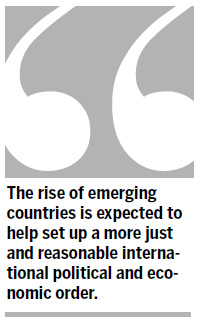Op-Ed Contributors
BRICS builds global balance
By Tao Wenzhao (China Daily)
Updated: 2011-04-12 08:00
 |
Large Medium Small |

Active efforts from emerging countries contribute to good governance and fairer distribution of world's wealth
The third summit meeting of BRICS countries is due to be held at China's resort city of Sanya later this week.
South Africa will join Brazil, Russia, India and China at this year's summit, where the participating leaders are expected to exchange ideas on economic and financial issues.
The continuing rise of developing nations, such as those of the newly enlarged BRICS, marks a significant change in the global economic and political landscapes and will have a far-reaching influence on world development.
Under the West-dominated international political and economic system, global wealth and power have been unevenly distributed between developed and developing countries for a long time. However, some subtle changes have occurred over the past two decades, especially since the outbreak of the global financial crisis in 2008.
|
||||
In sharp contrast, developing countries have overcome the impact of the global financial crisis and managed to achieve robust economic growth momentum. According to an estimate by the International Monetary Fund (IMF), economic growth in emerging countries reached 7.1 percent in 2010 and is expected to be 6.4 percent in 2011.
| 分享按钮 |



